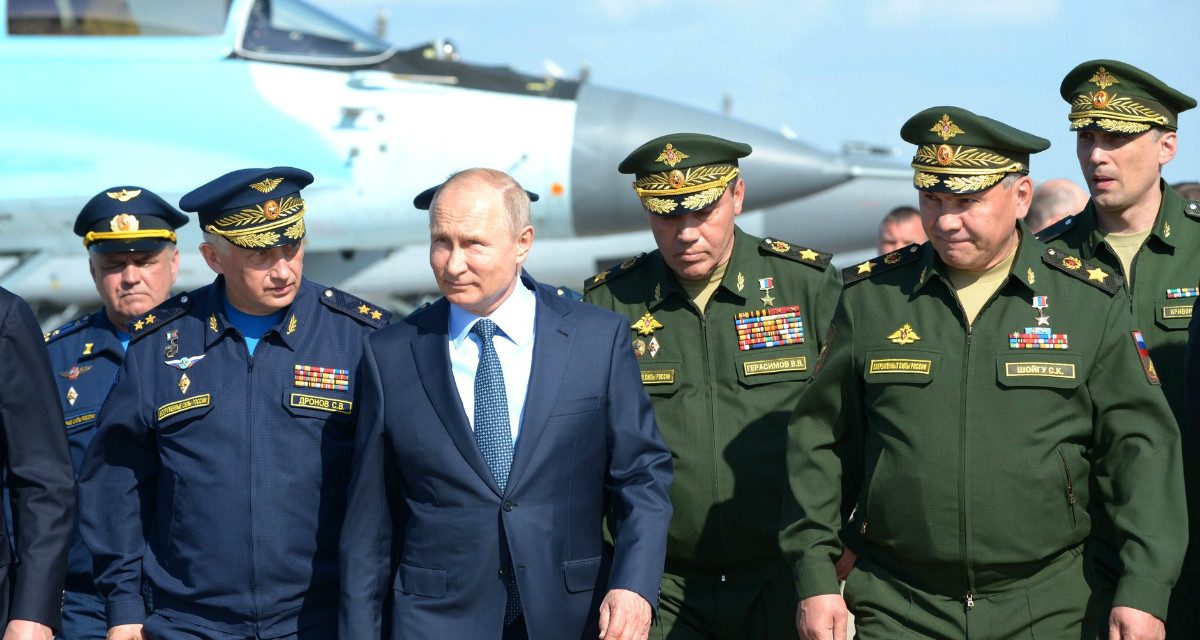Russia docks a warship in Havana knowing it will provoke a response from the United States. How dare they. The US Navy dispatched a destroyer to shadow the vessel; after all, the United States has the Monroe doctrine to enforce. A few weeks prior, Russia sent around a hundred troops to Venezuela. This also provoked a response, albeit rhetorical. Despite these US reactions, Russia continues to play strategic games.
Why did the United States respond to these actions in these ways? And what is the most appropriate response? After all, what real threat is a single ship or a company of soldiers? America, as it is said, is the leader of the free world. But what does it mean to lead in practice? For starters, the United States should actively work to avoid simply reacting to adversaries’ actions. Then it should execute its National Security Strategy.
Russia is a regional power in decline. Long gone are the days the country extended its influence over vast chunks of the world and could credibly claim to be a superpower. Sending bombers into other nations’ airspace and acting provocatively at sea represents the limit of Moscow’s resources. Even its annexation of Crimea and continued destabilization of eastern Ukraine is relatively low-hanging fruit. Colonizing the uncontested arctic is another small win the Kremlin can use to relive the glory days of superpower status.
How should the world respond? With respect to the United States specifically, Russian revanchism offers arguably the most significant ongoing test of US leadership in the world since the end of the Cold War. What options does the United States have to avoid appearing weak while also not allowing Russia to constantly shape environments? Is a reactive approach the best? Can the United States continue to afford small losses such as the breakaway regions in Georgia, Crimea’s annexation, or continued trouble in eastern Ukraine? How best can the United States respond to Russia’s hybrid warfare? Kremlin-directed actions that stay just below a threshold, or “redline,” are really difficult to generate responses to. Will creative options solve the problem? Maybe. But smart people have already determined a way to undermine Russia’s objectives; America just needs to follow through with its own strategy.
America and its allies continue to take Russia’s bait but lack adequate deterrent solutions. They are responsible world actors who realize escalation is the least preferable option. The world heavyweight champion has everything to lose when he steps in the ring with a challenger. The challenger has everything to gain. And yet, this is not a boxing ring. This is geopolitics. Russia will continue to use all the foreign policy tools at its disposal to act like a superpower. It doesn’t have to follow the rules of the liberal world order. In fact, President Vladimir Putin is transparent about this. He claimed that “the liberal idea has become obsolete” during a recent interview. This is his attempt to undermine the West. The only response to this claim should be to demonstrate what the liberal order is capable of.
The United States doesn’t need creative solutions. It is the keystone of the international order it helped to create nearly seventy years ago. Ignoring its own playbook—its own strategy—will only leave it in a reactive state. The other team has this playbook and has crafted its own plays to better advance the ball. But perhaps the United States should simply double-down on its strategy.
Russia sends one hundred troops to Venezuela? The United States should turn to page fifty-one of the National Security Strategy, which describes US interests and objectives in the Western Hemisphere, and act accordingly. This might take any number of forms, including, perhaps, sending a disproportionately large contingent of US soldiers to the Colombian border for a training exercise or to support counternarcotics operations. This is in alignment with the strategy, and such an action has the added bonus of deterring future Russian action.
Russia sends a bomber into Japanese airspace? Page forty-one: “The United States supports the peaceful resolution of disputes under international law but will use all of its instruments of power to defend U.S. interests and to ensure common domains remain free.” Take a stand, in line with the strategy, against Russia’s incursions. Leverage all instruments of national power to make clear that the statements in the National Security Strategy are not mere platitudes. This isn’t, of course, a call to simply shoot down an offending Russian aircraft, but an acknowledgement that the typical rhetorical response and occasional escalation of sanctions are expected, and since Russia is willing and able to absorb a great deal of sanction pain to accomplish its strategic goals, their deterrent impact is broadly negligible.
Russia has become an expert at low-cost, low-risk ways to make the United States and its allies nervous. The United States must remain resolute and proactive. The United States is the global superpower. When its allies are added, they hold a substantial majority the world’s military strength. Why then should they chase the actions of Russia? Rival nations who want a shot at the title need to be concerned about the United States, not the inverse.
When the United States becomes reactive, it stops leading. What does leadership look like in an age of comparatively receding but still very real hegemony? It consists of assuring allies. It consists of building weapons and technology and tactics to shape future environments to its advantage. It is a daily and hourly demonstration of resolve and vigilance. The liberal world order is not obsolete. It has contributed to stability and growth unparalleled in human history. But it needs to be defended.
The United States can and should continue to foster relationships with its partners and allies so that, in the aggregate, their collective strength is not just superior to any challenge, but vastly so. Mere rhetoric and reactive responses are not enough. The United States must focus on employing regional strategies and leveraging existing resources against the challenges confronting the nation. This long-term plan will create economic and security stability if America gives it a chance.
Strategic patience is needed alongside strategic resolve. Leadership—active leadership, leadership from the front—is required. The United States must focus on our national security objectives while avoiding the distractions that arise daily, if not hourly. Doing so might cause Kremlin decision-makers to think twice before future provocative acts. Or maybe Russia will continue to play its hand while its economy falters and its people grow discontent. This is why both resolve and patience are called for. But the United States must break the cycle of reactive responses and not return to it. We can do better. A mere tie is considered a loss for the reigning world champion.
Image credit: kremlin.ru



Russia has enough resolve and stored (natural) resources to still remain a "Player" in world events and politics. After all, doesn't Russia have vast diamond reserves in vaults that it can't sell yet? If so, don't believe that Russia is bankrupt.
As for proactive vs. reactive, I say that the Russians have an edge because they can always export arms that are more powerful and mobile than what we can export. Most of our First Rate weapons only go to our closest allies whereas Second and Third Rate weapons go to more distant allies. We don't have M60 MBTs to export anymore and no one wants to buy our Stingray II light tanks (yet). Unfortunately, Russia just needs to export 7.62mm AK-47s and reloadable RPGs which the shorter range lighter caliber M4 and M-16 might have a hard time defeating. That has always been a contention with the USA vs. Russia…the old AK-47 and RPG problem….these two low cost troublemakers for the West. Ironically, now the USA is making AK-47 and RPG copycats, but will we export those higher quality copycats?
The thin armor BTR and BMP with 14.5mm machine gun or 30mm cannon in a fully armored enclosed turret vs. the HMMWV export with no cannon and no turret. Which response is better? The ZSU-4 23mm AAA on an unarmored Technical pickup vs. the old thin armor M113 APC with 12.7mm machine gun. Which response is better?
Russia also has a Power Player with China as an frenemy ally and China's military is vast. The USA has no second comparison besides NATO combined, but some individual countries within NATO are much weaker than China.
Thus, a little Russian arms can go a long way. Do not underestimate Russia's influence with the AK-47 and RPG even if Russia uses the AK-74 now.
What the USA needs are more mobile lower cost solutions that pack a mighty punch. Why dispatch a F-35 to monitor when a Light Attack Plane or A-10 can do the same job? Why dispatch a SSN when a FFGX can do the same for cheaper? Why dispatch a LCS when it just has 57mm and needs SeaRAM or NSMs? Why dispatch a M1A2 SEPV3 MBT when a MPF can do (which the MPF doesn't exist yet). Russia has a wider array of cards to choose from than the USA. Green Berets dispatched as a reponse are just Special Operators on foot and the MRZRs and GMVs aren't really deployed for combat. BTRs and BMPs sure are. Which response is better and more influential? Would you rather take a light wheeled IFV into the brush than an open unarmored dune buggy?
Read the comments posted on this webpage of the official US Army. The comments offer some very good perspectives for West Point officers and students.
https://www.ausa.org/articles/our-army-again-optimized-defeat
The USA DOES test systems that are light and powerful like the Cockerill 90mm turret on a M1117, or the Stingray II Light Tank, or the LAV GEN 3 25mm non-Stryker, or the Wiesel 20mm. The USA needs to think more like NATO in exploring new and more mobile light firepower options. The HMMWV and MRAPs can only go so far doing so much as an Army QRF. It's an adage decades old, tried and tested since the M551 Sheridan.
st systems that are light and powerful like the Cockerill 90mm turret on a M1117, or the Stingray II Light Tank, or the LAV GEN 3 25mm non-Stryker, or the Wiesel 20mm. The USA needs to think more like NATO in exploring new and more mobile light firepower options. The